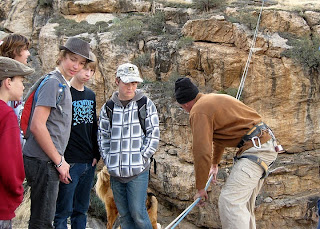A few years ago, I remembered receiving the following list from my brother in mission, Mustafa Mahdi, the director of The Rising Son, Inc., in Atlanta, GA. While The Rising Son mission has changed some over the years, I love his list of what was required of his young males before they could get an Elder recommendation for a rite of passage experience. In this case, a boy could start working anytime after his twelfth birthday, and if the tasks were completed, he could be sent up for initiation when he was sixteen.
- Maintain a "B" average or above in school.
- Cleans room and assists with household chores.
- Can prepare a complete meal for the entire family.
- Knows how to plant and maintain a vegetable garden.
- Knows how to fish, hunt and cook small game.
- Knows how to save a life (Basic CPR/First Aid skills).
- Knows how to swim the length of an olympic pool.
- Can run at least 1 mile in 10 minutes or less.
- Knows basic auto repair and maintenance.
- Knows basic carpentry, electrical and plumbing repair.
- Has completed Domestic Violence Prevention workshop.
- Has completed Abstinence & Male/Female Relationship workshop.
- Has a basic knowledge of self-defense and conflict resolution.
- Has a minimum of $100.00 in a savings account.
- Has completed a driver's safety course & has a learner's permit.
- Has visited a local college and met with an academic advisor.
- Has visited a technical vocational school & met with an advisor.
- Has selected a "Career Coach" working in his chosen profession.
- Can draw a "Family Tree" listing all living relatives.
What would be on your list?
More importantly, who was the man that helped guide YOU through the maze of masculine competencies?
What happens to boys who don't have men to show them even the basics?
If you have some suggestions for the list or a comment about teaching boys to be men in this way, send an email to me at Earl at Man-Making dot com, or add it to the Comments section of this post on the Man-Making Blog homepage.
If you're not yet a subscriber to the Man-Making Blog, and you'd like to receive these posts by email 3-4 times a month, go to this link for a free subscription.






